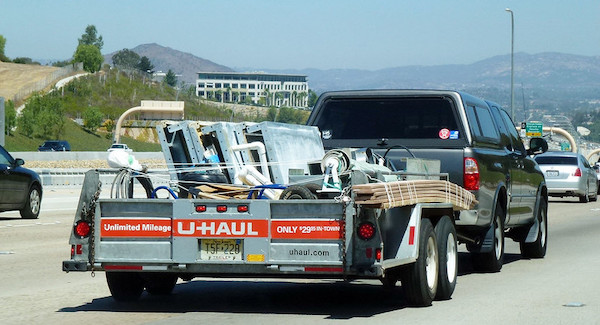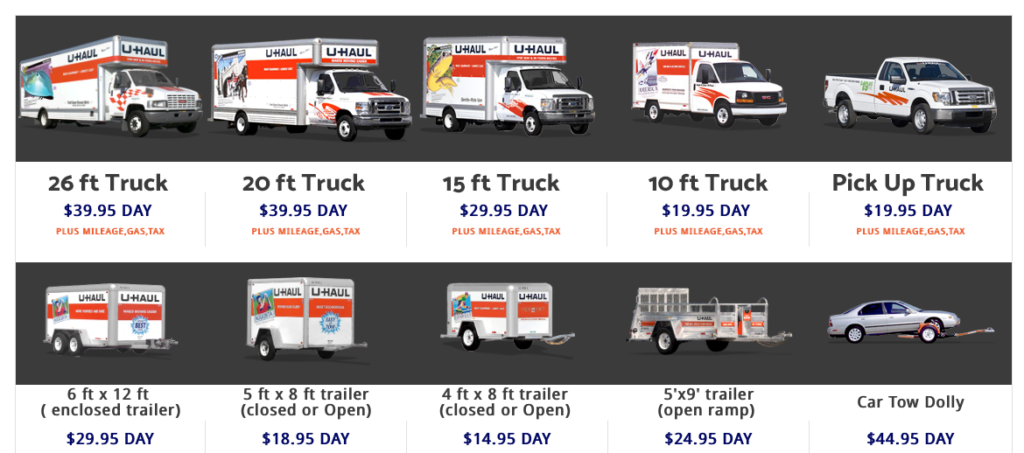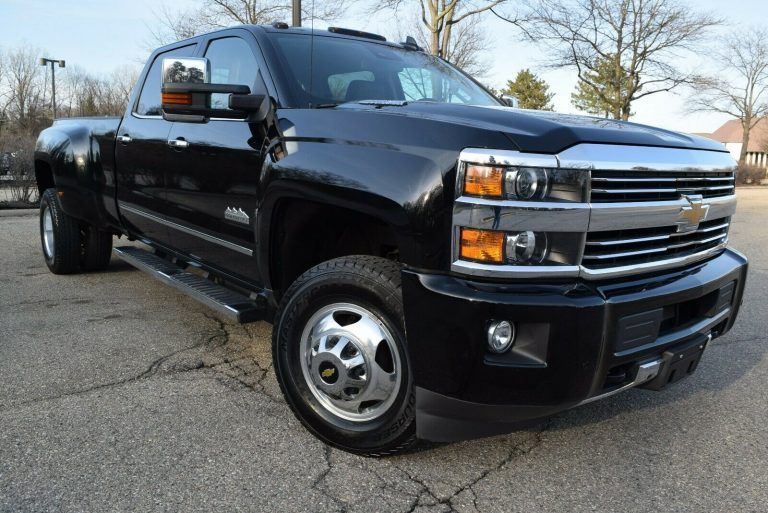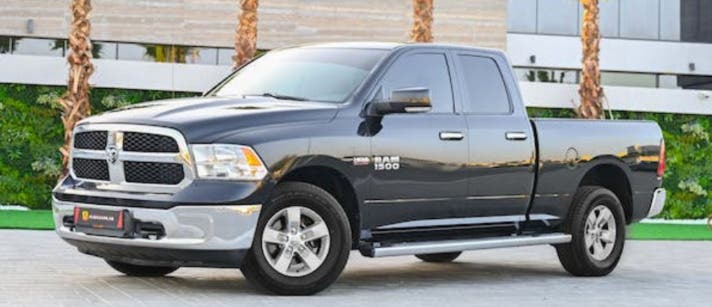How Much Is A U-Haul Trailer: A Comprehensive Guide to Rental Costs
How Much Is A U-Haul Trailer: A Comprehensive Guide to Rental Costs cars.truckstrend.com
Moving, hauling, or transporting vehicles can often feel like a daunting task, and one of the first questions that comes to mind for many is, "How much is a U-Haul trailer?" U-Haul has long been a go-to solution for DIY movers and those needing to transport goods or vehicles, offering a wide array of trailers designed for various purposes. However, the cost of renting a U-Haul trailer isn’t always straightforward, as it depends on a multitude of factors. This comprehensive guide will break down the pricing structure, explore the different types of trailers available, provide practical advice, and offer clear insights to help you budget effectively for your next hauling adventure.
Understanding the true cost of a U-Haul trailer involves looking beyond a simple daily rate. It encompasses the size of the trailer, the duration of your rental, whether you’re embarking on a local in-town move or a long-distance one-way journey, your specific location, and even the time of year. By the end of this article, you’ll have a clear understanding of what to expect financially when considering a U-Haul trailer rental, empowering you to make an informed decision.
How Much Is A U-Haul Trailer: A Comprehensive Guide to Rental Costs
Understanding U-Haul Trailer Rental Costs: The Basics
At its core, U-Haul trailer pricing is built on a base rental rate, which then gets adjusted by several key variables. It’s crucial to distinguish between two primary rental types:
-
In-Town (Local) Rentals: These are typically priced on a daily basis. You pick up and return the trailer to the same U-Haul location. The cost is generally lower for these rentals because the trailer doesn’t need to be transported back to its original location by U-Haul, reducing their logistical overhead. These rates are often very competitive, sometimes starting as low as $14.95 or $19.95 per day for smaller trailers.
-
One-Way Rentals: Designed for long-distance moves where you pick up the trailer at one U-Haul location and drop it off at another. The pricing for one-way rentals is more complex and usually higher. It’s not a simple daily rate but rather a fixed fee for a set number of days and miles, determined by the origin, destination, and the current demand for equipment on that specific route. This cost covers the logistical challenge of moving their equipment across the country.

Beyond the base rate, you’ll encounter potential additional charges such as environmental fees, taxes, and optional add-ons like insurance or moving supplies. The goal is always to get an accurate quote based on your specific needs, which we’ll delve into later.
Factors Influencing U-Haul Trailer Prices
The "how much" question is rarely answered with a single number because so many variables come into play. Here are the primary factors that will dictate the final cost of your U-Haul trailer rental:

1. Trailer Size and Type
U-Haul offers a variety of trailers, each designed for different purposes and capacities, directly impacting the price. Larger trailers or specialized vehicle transport trailers will naturally cost more than smaller utility or cargo trailers.
- Cargo Trailers (Enclosed): These are fully enclosed trailers, protecting your belongings from the elements. They come in various sizes (e.g., 4×8, 5×8, 5×10, 6×12).
- Utility Trailers (Open): These are open-top trailers, ideal for hauling landscaping materials, ATVs, or oddly shaped items. Sizes include 4×7, 5×8, and 6×12.
- Vehicle Transport Trailers:
- Tow Dolly: A two-wheel trailer that lifts the front wheels of your towed vehicle off the ground, ideal for front-wheel drive cars.
- Auto Transport Trailer: A four-wheel trailer that carries the entire vehicle off the ground, suitable for all vehicle types and longer distances.

2. Rental Duration
For in-town rentals, the cost is typically a daily rate. If you keep the trailer longer than the agreed-upon rental period, you will incur additional daily charges. For one-way rentals, you’re usually given a specific number of days to complete your trip; exceeding this can lead to late fees.
3. Distance and Route (One-Way Rentals)
This is a major determinant for one-way costs. The price isn’t just about the miles; it’s heavily influenced by the supply and demand for trailers at your specific pick-up and drop-off locations. Renting a trailer from a city with an excess of equipment to a city with a deficit might be more expensive, and vice-versa.
4. Location (Pick-up and Drop-off)
Prices can vary slightly based on the specific U-Haul dealer or region. Urban centers with higher demand or operating costs might have slightly different pricing structures compared to rural areas.
5. Time of Year and Demand
Just like flights and hotels, U-Haul prices can fluctuate with demand. Peak moving seasons (summer months, especially June-August, and the end/beginning of each month) generally see higher prices and lower availability due to increased demand. Booking well in advance during these times is crucial.
6. Additional Equipment and Services
When calculating your total cost, remember to factor in any additional items or services you might need:
- Hitch Installation: If your vehicle isn’t already equipped with a proper hitch and wiring, U-Haul can install one for you, which is an additional cost.
- Moving Supplies: Boxes, tape, dollies, furniture pads, etc., are all extra.
- Insurance: U-Haul offers optional coverage plans like SafeTow® (for trailers) that protect you against damage to the trailer or your belongings. While optional, it’s highly recommended for peace of mind.
7. Taxes and Fees
Expect to pay applicable sales tax on your rental. There might also be environmental fees or other administrative charges depending on your location.
Types of U-Haul Trailers and Their Typical Costs
Below is a table outlining the common types of U-Haul trailers and their approximate rental costs. Please note that these are estimates and actual prices can vary significantly based on the factors discussed above, especially for one-way rentals. Always get a direct quote from U-Haul for the most accurate pricing.
U-Haul Trailer Rental Price Guide (Estimated Costs)
| Trailer Type | Dimensions (Approx.) | Capacity (Weight/Volume) | Typical Local Daily Rate (Estimate) | Typical One-Way Rate (Estimate) | Best For |
|---|---|---|---|---|---|
| Cargo Trailers (Enclosed) | |||||
| 4×8 Cargo Trailer | 4′ x 8′ x 4.5′ | 1,600 lbs / 142 cu. ft. | $14.95 – $19.95 | $150 – $400+ | Small moves, dorm rooms, few large items. |
| 5×8 Cargo Trailer | 5′ x 8′ x 5′ | 1,800 lbs / 200 cu. ft. | $19.95 – $24.95 | $200 – $500+ | Studio/1-bed apt, furniture, appliances. |
| 5×10 Cargo Trailer | 5′ x 10′ x 5.5′ | 2,000 lbs / 250 cu. ft. | $24.95 – $29.95 | $250 – $600+ | 1-2 bed apt, larger furniture, boxes. |
| 6×12 Cargo Trailer | 6′ x 12′ x 6′ | 2,500 lbs / 396 cu. ft. | $29.95 – $34.95 | $300 – $800+ | 2-3 bed apt/small home, most household goods. |
| Utility Trailers (Open) | |||||
| 4×7 Utility Trailer | 4′ x 7′ | 1,770 lbs | $14.95 – $19.95 | Not typically for one-way | Landscaping, small equipment, ATV. |
| 5×8 Utility Trailer | 5′ x 8′ | 1,890 lbs | $19.95 – $24.95 | Not typically for one-way | Medium equipment, lawnmowers, furniture. |
| 6×12 Utility Trailer | 6′ x 12′ | 2,670 lbs | $29.95 – $34.95 | Not typically for one-way | Large equipment, small vehicle, bulky items. |
| Vehicle Transport Trailers | |||||
| Tow Dolly | N/A | 3,450 lbs (vehicle weight) | $39.95 – $49.95 | $150 – $500+ | Front-wheel drive cars, short distances. |
| Auto Transport | N/A | 5,290 lbs (vehicle weight) | $59.95 – $69.95 | $200 – $800+ | All vehicle types, longer distances, larger cars. |
Disclaimer: All prices are estimates and subject to change based on location, availability, demand, rental duration, and specific U-Haul promotions. One-way rates vary significantly by route and time of year.
How to Get an Accurate U-Haul Trailer Quote
The best way to know "How much is a U-Haul trailer" for your specific needs is to get a direct quote. U-Haul’s online reservation system is the most efficient way to do this:
- Visit the U-Haul Website: Go to UHaul.com.
- Select "Trailers": Navigate to the trailers section.
- Enter Your Details:
- Pick-up Location: Enter the city, state, or zip code where you want to pick up the trailer.
- Drop-off Location (for one-way): If it’s a one-way rental, specify your destination. For in-town, it will default to the same pick-up location.
- Pick-up Date: Choose your desired pick-up date.
- Select Trailer Type: Browse the available trailer types (cargo, utility, auto transport) and select the size that best fits your needs. The system will then display the estimated cost for your chosen parameters.
- Review the Quote: The quote will break down the rental fee, estimated taxes, and any other applicable charges. You can also add optional insurance at this stage to see the total cost.
You can also call a local U-Haul center or their central reservation line to speak with a representative and get a quote.
Practical Advice & Money-Saving Tips
Renting a U-Haul trailer can be cost-effective if you plan strategically. Here are some actionable insights:
- Book in Advance: Especially for one-way rentals or during peak moving seasons, booking weeks or even months ahead can secure better rates and ensure availability.
- Be Flexible with Dates/Locations: If your schedule allows, try to pick up or drop off on weekdays rather than weekends, or during off-peak seasons. Sometimes adjusting your pick-up or drop-off location by a few miles can significantly impact a one-way rate.
- Choose the Right Size: Don’t rent a trailer that’s too big (paying for unused space) or too small (requiring multiple trips or not fitting everything). Use U-Haul’s online estimators or consult with staff to determine the ideal size based on the volume and weight of your belongings.
- Understand Your Towing Vehicle: Ensure your vehicle has the appropriate towing capacity, hitch class, and wiring. This is non-negotiable for safety. Factor in the cost of hitch installation if needed.
- Consider DIY Hitch Installation: If you’re handy, installing a hitch yourself (or having a local mechanic do it) might be cheaper than U-Haul’s installation services, but ensure it meets safety standards.
- Evaluate Insurance Options: While an added cost, U-Haul’s SafeTow® provides coverage for damage to the trailer and your belongings. Check your personal auto insurance policy first; some policies offer limited coverage for rented trailers. The peace of mind often outweighs the cost.
- Return On Time: Avoid late fees by returning the trailer promptly at the agreed-upon time.
- Pack Efficiently: Proper packing and loading techniques can maximize space and potentially allow you to rent a smaller, cheaper trailer.
Important Considerations Before Renting
Beyond the cost, several critical factors must be considered to ensure a safe and successful rental experience:
- Towing Vehicle Requirements:
- Towing Capacity: Your vehicle’s Gross Vehicle Weight Rating (GVWR) and Gross Combined Weight Rating (GCWR) must be sufficient for the trailer’s weight plus its contents.
- Hitch Class: You’ll need a proper hitch receiver (Class I, II, III, etc.) that matches the trailer’s tongue weight and overall weight.
- Electrical Connection: A functional wiring harness (usually 4-pin or 7-pin) is required for trailer lights (turn signals, brake lights, running lights).
- Safety:
- Loading: Load heavier items over the trailer’s axle and distribute weight evenly to prevent swaying.
- Hook-up: Ensure the trailer is securely hitched, safety chains are crossed, and the electrical connection works.
- Tire Pressure: Check the trailer’s tire pressure before departing.
- Driving with a Trailer:
- Speed Limits: Obey reduced speed limits for vehicles towing trailers.
- Turning & Braking: Allow for wider turns and significantly increased braking distances.
- Visibility: Use extended mirrors if necessary.
- Insurance: As mentioned, review your personal auto policy and consider U-Haul’s SafeTow® coverage for added protection.
- Availability: Especially during peak times, specific trailer sizes or one-way routes might be limited. Book early to secure your preferred equipment.
Frequently Asked Questions (FAQ)
Q1: Can I rent a U-Haul trailer for one way?
A1: Yes, U-Haul offers one-way rentals for most of its enclosed cargo trailers and vehicle transport trailers (Tow Dolly, Auto Transport). Utility trailers are generally for in-town use only.
Q2: Do I need a special license to tow a U-Haul trailer?
A2: In most cases, no. For typical U-Haul trailers towed by standard passenger vehicles, a regular driver’s license is sufficient. However, always check your state’s specific regulations regarding combined vehicle and trailer weight limits, as some larger combinations might require a special endorsement or commercial driver’s license (CDL).
Q3: Does U-Haul install hitches?
A3: Yes, U-Haul offers hitch installation services at many of its locations. They can install hitches and wiring harnesses necessary for towing. This is an additional cost.
Q4: What kind of insurance do I need for a U-Haul trailer?
A4: Your personal auto insurance policy may offer some coverage for rented trailers, but it’s often limited. U-Haul offers optional coverage plans like SafeTow® which protects you from damage to the U-Haul trailer and your belongings inside it. It’s highly recommended to review your existing policy and consider U-Haul’s options for comprehensive protection.
Q5: Are U-Haul trailer prices negotiable?
A5: Generally, no. U-Haul operates on fixed, dynamic pricing based on their system’s calculations for demand, location, and availability. Direct negotiation is typically not possible.
Q6: What if I return the trailer late?
A6: U-Haul charges late fees if you do not return the trailer by the agreed-upon time. It’s crucial to adhere to your rental agreement to avoid additional costs. If you anticipate a delay, contact U-Haul immediately.
Conclusion
Understanding "How much is a U-Haul trailer" is more than just knowing a single price point; it’s about grasping the dynamic factors that influence the cost. From the size and type of trailer to the duration of your rental, whether it’s an in-town or one-way journey, and even the time of year, each element plays a significant role.
By utilizing U-Haul’s online quoting system, planning in advance, being strategic about your rental details, and understanding the necessary safety considerations, you can effectively manage your budget and ensure a smooth, cost-efficient hauling experience. U-Haul trailers remain an invaluable resource for countless moving and transport needs, offering flexibility and affordability when approached with proper planning.





